Another week, another Merry-Go-Round Music Roundup

Action Bronson – White Bronco
Genre: East Coast Hip Hop
Favorite Tracks: “Irishman Freestyle,” “Prince Charming,” “Ring Ring (featuring Big Body Bes)”
“Hey, Bronson! Want some? Ah fuck it, why the hell not?” might just perfectly summarize who Action Bronson is and what he brings to the rap sphere today. Coming from the song “Mt. Etna” off his latest release WHITE BRONCO, the line is part of a skit/outro featuring a vintage anti-marijuana ad in which Bronson eventually succumbs to peer pressure and partakes in the drug. Ironically, such a scenario is placed on a record that does anything but give in to pressures from the changing standards of hip hop today. Listeners will not hear a single trap drum, Auto-Tuned chorus, or mention of “xans.” I mean, this is Bam Bam! Bronsolino! Mr. Baklava! And those kind of SoundCloud tropes are just not his style. What you should expect to indulge in is a medley of soulful samples and muddy guitar licks that have become lost in mainstream rap. All underneath the distinct brand of wacky braggadocio and astute food references we have come to expect from the Queens-born chef-turned-lyrical-sommelier.
Neighing horses, car horns, and firecrackers set the tone for a typical Action record meant for nothing more than a good time with a few laughs. Phrases such as, “She was right, I was blinded by the pussy like / Gotta make it home because my wifey said it’s cookie night / Plus I owe two hundred large to the bookie / I think I might boogie,” on “Brutal” are as smart are they are headscratchers. It’s that kind of “Ah fuck it, why the hell not?” mentality in his lyricism and ambience which allows Bronson to meaningfully stand out from the herd and build a core audience that will stick with him from albums to digital cooking shows alike. He is not trying to capture a sociocultural moment the way a Kendrick Lamar does, nor does he open himself up with the vulnerability Mac Miller used to bring to a track. WHITE BRONCO, given its wonderfully short running time (26 minutes), provides a brief escape from a tumultuous world to a place of pudding and machine gun money where Chef Bronson serves up exactly what he wants. [Michael Stanziale]

Big Red Machine – S/T
Genre: Art Pop
Favorite Tracks: “Lyla,” “I Won’t Run From It,” “OMDB”
BIG RED MACHINE is a record that, to be totally honest, had a pretty slim-chance of being a world-shaking event. A collaboration between Bon Iver’s Justin Vernon and The National’s Aaron Dessner is pretty likely to sound like, well, a collaboration between Bon Iver and The National. And, even though there are 40 or so credited contributors to the project, it does sound just like that. Nevertheless, both of those bands have earned success by making dark and pensive indie rock that manages to be both progressive and accessible at the same time. BIG RED MACHINE seems to want to shed some of that accessibility (as many side/vanity projects are wont to do), but despite its own best efforts, it still just sounds like a collaboration between Bon Iver and The National. Is that a bad thing? Absolutely not! And there are some really genuinely fun moments on BIG RED MACHINE that probably wouldn’t have their place in Vernon and Dessner’s cash-cow projects. “Lyla” introduces a new version of the classic Justin Vernon vocal in which he seems to channel the scooping and whooping of his semi-frequent collaborator Kanye West, and it’s way more enjoyable than that may sound to some. It also elevates “Lyla” beyond its potentially otherwise unremarkable status. The record, arguably, saves its best for last, as “Forest Green” and “OMDB” are both gorgeous behemoths of songs that are anchored by excellent guitar work from Dessner, and “I Won’t Run From It” has a real fun 1992-era Bruce Hornsby feel to it that is complemented well from skittery and percussive drum and vocal accentuation. Ultimately, though, there isn’t a song on this record that hooks into one’s brain in the same way that a great National tune will, and Dessner and Vernon don’t really deviate from the norm enough for this to be much more than a footnote to their more successful stuff. There isn’t enough scooping and whooping to elevate BIG RED MACHINE to an essential record for anyone who isn’t a massive fan of one or both of the Machine’s components, but it still has several beautiful and interesting moments that make it worth checking out. [Adam Cash]

Marie Davidson – WORKING CLASS WOMAN
Genre: Minimal Synth, Tech House
Favorite Tracks: “Your Biggest Fan,” “Work It,” “Lara,” “Workaholic Paranoid Bitch,” “Burn Me”
WORKING CLASS WOMAN spends most of its duration deep in the caverns of Marie Davidson’s mind. The mood is that of a club at five in the morning, not quite up to code, holding less than a 10th of the max capacity. Davidson’s voice is the record’s catalyst, bookending with spoken word performances over spacey synths. The eight tracks sandwiched in between lean towards the darker, more aggressive side of the Quebecois producer’s range, especially on songs like “Lara” and “Workaholic Paranoid Bitch,” where she deep-dives into wormholes of rattling percussion and hammering synths. “Work It” and “The Psychologist” are equally unrelenting; both have the trappings of peak hours anthems, but “Work It” drills harder and leaves a much stronger impression. It’s the grittier sibling to “Sex Jam,” one of Davidson’s best singles by way of one of her many side projects, SLEAZY.
Like most of Davidson’s work, WORKING CLASS WOMAN is critical of dance music and its culture while delivering some of the year’s most infectious tracks. “Your Biggest Fan” takes shots at “fans” who get too invasive while splicing in self-criticism atop an echoing bass synth. The back-and-forth reaches a painful conclusion that elicits a cathartic release over the course of the record. It’s easy to get lost in the sound design for stretches, but Davidson’s narration periodically returns to anchor the album’s narrative, making it one of the most self-aware and self-effacing dance records of the year. [Ryan Moloney]

Tim Hecker – KONOYO
Genre: Ambient, Electroacoustic, Drone
Favorite Tracks: “This life,” “Is a rose petal of the dying crimson,” “A sodium codec haze,” “Across to Anoyo”
This album is fire, ok? That cover art does not lie. Whatever’s going on in it—that broken glass, the fucking keyboard on fire (or maybe it’s shooting flames, I’m not sure, either way it’s sweet), the metal frame being bent, that puddle on the ground, the mirror effect being used—it’s all here on KONOYO in an awesome, disintegrating fury. It’s like if Tim Hecker decided to score a John Carpenter or Dario Argento doomsday flick. There’s these eerie, Goblin-esque synths that just portend the worst of demises and it’s still beautiful—you want to (and you do) melt in it even if it spells your end. Hecker has never exactly dabbled in happy sounds, but they’ve always been gorgeous, cavernous, and deliquescent, and here he’s at his peak powers. “This life” sets the stage for the aural apocalypse, which is anything but loud and chaotic… Hecker’s version is a slow, dreadful glaze over. In its coda we are overtaken by unstable voltage—scrapes and zaps, sounds of the digital. In a genre where digital is king, it only makes sense that an end-of-the-world themed album would have our undoing be at the hands, or code, of some technological behemoth. “Is a rose petal of the dying crimson light,” with its distant, siren-like woodwinds, weeping synths, and wavering drift, plays perfectly as the brooding rise to “Keyed out.” If the former is wading through the sea of dead tech bits and pieces, the castle’s moat, then the latter is our arrival at evil’s headquarters (probably something with a huge Apple logo emblazoning the doors)… Or rather, the arrival of evil itself. It’s taking its time, though, each step after the other evaporating into pixels, deceiving you of its location. Shrill, glitchy strings break in throughout, like someone scraping a violin on a chalkboard, but eventually the terror subsides with only the occasional spurts of static and sporadic drumming. By the end, those same digital strings become a little more melodic, still disquieting, but all-in-all soothing, like a lullaby. It’s rare for me that an album makes me feel simultaneously uncomfortable and eager to delve into that discomfort. Throughout, the songs are apt to put you at unease in the beginning before calming down and washing you off with all the debris in its wake. Oddly, it’s eventually the aftermath that Hecker conditions you to crave; in all of its ruin, it’s when it’s most serene.
KONOYO seems to be one of Hecker’s most diverse albums, incorporating a variety of instruments, and on finale “Across to Anoyo,” it seems the artist has been left in his studio with all of his playthings. Plucked strings and truncated drums loop crescendo alongside volatile reverb—far in the background, faint buzzing sways; by the time we reach the climax, we’re engulfed in a swell of interminable synths and digital clangs. It eventually softens, the synths never totally die out, and piano joins the track to carry us to the end. I know it’s a bit trite to say an ambient album immerses you, or that it has synesthetic effects, but KONOYO really accomplishes just that. It is a truly formidable, deep soundscape—you can see every layer—the whole land being traversed, what’s in front of you, what’s behind you, what’s in the distance, and where you have yet to reach. It’s an experience. It is an album meant for entire listens, no half-assed stop and starts. You sit down and you soak in this bad boy, not a little splash, I’m talking fucking full-on, shoes-dripping, clothes-sopping level douse-age. You owe it to yourself. [Nick Funess]
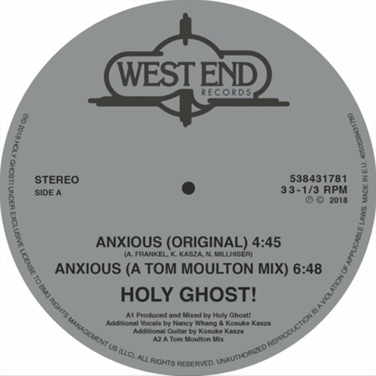
Holy Ghost! – ANXIOUS / SPIRIT OF SUNSHINE
Genre: Disco
Favorite Tracks: “Anxious (A Tom Moulton Mix),” “Spirit of Sunshine (Holy Ghost! Remix)”
An EP with Tom Moulton and The Chuck Davis Orchestra released on West End Records would’ve been the most anticipated release of the week back in the late ‘70s. In 2018, it failed to even be a blip on the radar. Holy Ghost!’s unheralded return to the studio doubled as a return to the height of disco, assembling a cast of characters that truly should’ve turned more heads. The New York duo’s new single, “Anxious,” is their best single in years. The classic shimmering disco synths are a great pairing for the hook that is admittedly a bit derivative of their older tracks, but is solid nonetheless. Holy Ghost! Even somehow managed to get Tom Moulton onboard to remix the single, and while his mix doesn’t sniff the legendary work he did producing for the likes of Grace Jones or Gloria Gaynor, the subtle punch-up outshines the original. The B-side belongs to The Chuck Davis Orchestra’s 1977 single, “Spirit of Sunshine,’’ which was originally released of West End Records as well. Holy Ghost!’s remix is a fantastic modern reimagining, utilizing a number of synths and filters that warble the original bass, giving it more of an edge. Hopefully, this EP is a tune-up for an upcoming LP, but for now, the history lesson is more than enough. [Ryan Moloney]

IAN SWEET – CRUSH CRUSHER
Genre: Indie Rock
Favorite Tracks: “Bug Museum,” “Hiding,” “Your Arms Are Water”
CRUSH CRUSHER, the second full-length from indie pop trio IAN SWEET, is bittersweet and restless. Over the course of the record, the group contradicts the warmth of chordal guitars with harsh lyrics and the tenderness of solo instruments with the pinch of frontwoman/writer Jillian Medford’s vocals. Most of Medford’s lyrical themes are dark, but rather than emphasizing through volume, belting, or dissonance, they come through in the repetition of simple phrases and controlled amounts of clash. On the opening track, “Hiding,” she sings, “I forgot myself in you, you, you.” The album’s second track, “Spit,” similarly deals with being overcome by another person, but as being “swallowed” with more image-invoking bite, “by someone else’s spit,” rather than simply “hiding.” Pretty much every track features this repetition, and each time a phrase or word is said, it’s like she’s re-examining it, similar to how saying something over and over makes it change meaning, lose meaning, remind of you something else, or not even sound like words anymore. That laser-focus pinpoints how one thought can solicit a million more, and at just under 40 minutes, it’s more than enough time to become fully invested in Medford’s thoughts.
While the lyrics are tossed in different iterations, the band seamlessly float underneath. The texture is consistent from song to song and parallels the idea that simplicity is often best. You don’t have to have crazy guitar solos to be memorable, and sometimes effortless riffs can carry the same weight. The trio delivers a solid set of tunes that will undoubtedly have new meaning with each listen and deserve a place in any indie pop fan’s repertoire. [Stephanie Caress]
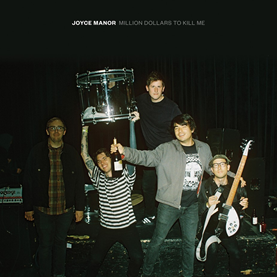
Joyce Manor – MILLION DOLLARS TO KILL ME
Genre: Power Pop, Indie Rock
Favorite Tracks: “Think I’m Still in Love with You,” “Big Lie,” “I’m Not the One”
Joyce Manor, the squad of rascally youths we’ve known them to be, has done a lot of growing up in the past two years, and on their new album, MILLION DOLLARS TO KILL ME, the maturity brings restraint with middling returns. The first single and stand-out cut, “Think I’m Still in Love with You,” finds lead singer Barry Johnson waxing spurned romanticism, the rejection highlighted by a supremely head-nodding guitar riff that stands right beside all the best unrequited love ballads of pop-punk’s past. It’s not as rowdy as older tracks, still cut from the same lyrical cloth—Johnson’s vocals and the instrumentation here are noticeably subdued—but the resistance is still present (“And even if it isn’t right / I still got to put up a fight”). Johnson sticks to a similar style in the title track, his quiet melisma nearly veering off into Jack Antonoff territory; the following “Silly Games” finds a rare moment of Johnson taking backseat to the band: the twee xylophone, the near-droning guitar, the plinking piano. It’s definitely their cleanest sounding record yet, with little-to-none of that fuzz or yawp that they first foamed with. And there’s nothing wrong with that—Joyce Manor does it fine—it just lacks the drunken, carefree spontaneity we love them for. That same “umph” does resurge for a moment on “Big Lie,” merging successfully with their newfound moderation and showing that it’s still possible to please everyone, old and new fans. The final track, the frilly “Wildflowers,” amounts to little more than a banal exercise in daintiness—the guitar in the bridge is not far off from elevator muzak, and that’s something I never thought I’d compare Joyce Manor to. Earlier in the album we have “I’m Not the One,” and while yes, it’s also light and airy, it makes up for it with quirky lines like “Dog at the door / who’s the king of hardcore / ‘cause he’s always been.” “Wildflowers,” unless I’m missing the wink and smile, just seems like a slight ending to an overall slight album. [Nick Funess]

Passenger – RUNAWAY
Genre: Singer/Songwriter, Americana Folk
Favorite Songs: “Hell or High Water”, “Ghost Town”, “Runaway”, “To Be Free”, “Survivor”
After taking a well-deserved and overdue break, Mike Rosenberg, aka Passenger, is back with his 10th studio album, RUNAWAY. He lulls us in with the opener, pairing his breathy storytelling with a beautifully haunting melody on “Hell or High Water.” Rosenberg has come a long way since his first busking days nine years ago, accompanying his guitar strumming with muted banjo and strings in the background. If anyone was worried last summer when this rugged English Troubadour announced his prolonged hiatus, he abates those fears in the first verse of RUNAWAY, openly talking about the struggles and sacrifices he was faced with while on tour and travelling the world for eight years: “And after stumbling through the years / I thought I found you, just to see you fading out into the night.”
Never one to shy away from being vulnerable, the theme of searching for love carries over to “Heart To Love.” Rosenberg has done a great job of tying it into all aspects on RUNAWAY. Is he running away from touring, or running away from the difficult task of finding love by going on tour. It’s a bit of a paradox, isn’t it? That in order to find love you have to find yourself? And that’s exactly what he talks about in “Let’s Go,” where the pace picks up dramatically with a swaying upbeat melody that’s meant to encourage you to go “Live life, don’t dream it.” The album closes with “Survivors,” a track which perfectly marries the Passenger we’ve all come to know and love with his newer sound, a subtle shift that reminds very slightly of the opening of “Sing” by Travis, but a folksier singer-songwriter version. RUNAWAY carries Passenger’s Americana influences with tracks likes “Eagle Bear Buffalo,” and if you watch the video for “Hell or High Water,” you’ll catch glimpses of various US National and State Parks. It feels like in all his years passing through every town imaginable, he truly has learned from all the musicians he’s met and collaborated with in order to make himself a better artist. Through most of those encounters, Passenger has written some amazing songs from widely interesting perspectives (i.e. “Bullets” and “Riding to New York” off of 2014’s WHISPERS), and unfortunately that’s an aspect that’s perhaps missing on RUNAWAY, even if he’s traded in microscopic moments for bigger picture stories. Has he written a new “Let Her Go?” While he’s written many songs here better than his so-called greatest hit, not many of them are mainstream enough. If you’re not convinced by the intricate and elaborate production of RUNAWAY, I recommend you listen to the live recordings on the deluxe version. Rosenberg and his guitar prove once again that they are pure perfection and cannot be beat, not even by studio recordings. [Liliane Neubecker]
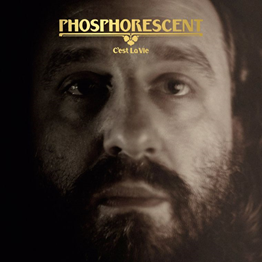
Phosphorescent— C’EST LA VIE
Genre: Folk Rock
Favorite Tracks: “C’est La Vie No. 2”, “These Rocks”
Everything on Phosphorescent’s latest release, C’EST LA VIE, sounds like something else. “Black Waves / Silver Moon,” an ambient instrumental, resembles Ben Howard’s I FORGET WHERE WE WERE, but fails to reach the depth of the latter. “Around the Horn” is a War on Drugs soundalike attempt, with no justification for its length of eight minutes. Meanwhile, the gospel-style sing-a-long of “New Birth in New England” feels derivative of not just one thing, but everything, a wash of feel-good, average pop rock that floats around every grocery store and eHarmony commercial. “Christmas Down Under” sounds like it should have been on the 2012 compilation album HOLIDAYS RULE, a folk(ish) song with Christmas(ish) lyrics like “Some say that Jesus had a daughter / But I don’t guess he ever met her.” While I can’t imagine a situation in which it would be cool to listen to this song, it has a fair shot of soundtracking a Subaru ad this holiday season. The album is not without its effective moments—“C’est La Vie No. 2” has the effervescence of Phosphorescent’s biggest hit, “Song for Zula,” which appeared in THE AMAZING SPIDER-MAN 2. It’s a pretty track, and has a cinematic quality. “These Rocks” evokes a haunting somberness akin to Iron & Wine. But it’s dangerous territory when an album simply reminds you of other artists whom you enjoy more. C’EST LA VIE is weighed down by adherence to tradition and conventions, plodding along down the beaten-to-death path until it has run out of steam. It’s technically well-produced, thoughtful, and sincere, but it’s nothing you haven’t heard before. [Claire Epting]

Trevor Powers – MULBERRY VIOLENCE
Genre: Glitch Pop
Favorite Tracks: “XTQ Idol,” “Playwright,” “Ache”
Youth Lagoon had a good thing going. Trevor Powers’ three albums under his prior moniker blurred the lines between indie rock, hazy dream pop, and world-influenced psychedelia. When Powers announced the end of Youth Lagoon in 2016, his motives were confusing and the loss of a truly unique act was pretty disappointing. What is even more strange is that now, just two years after we thought Powers had disappeared from the spotlight for good, he’s back with an album under his own name that sounds pretty much exactly the same as Youth Lagoon. Although Powers issued a letter explaining his decision to abandon his previous endeavor and continue releasing music sans pseudonym, there are few noticeable aesthetic distinctions between his two projects. Sure, MULBERRY VIOLENCE has cleaner production and more hip hop-influenced synthesizers, but Powers still sings in the same voice and mumbles about the same nostalgic, self-aware content in a very Youth Lagoon-esque manor. “XTQ Idol” and “Playwright” are both excellent tracks, but I refuse to pretend that they aren’t just Youth Lagoon songs.
MULBERRY VIOLENCE dabbles lightly in Western music, which is territory Youth Lagoon briefly explored on tracks like “Mute.” Unfortunately, because the music is so sequenced, the creative potential that the utilization of new scales can open up ultimately sounds kind of cheesy. Trevor Powers was almost able to reinvent himself as an experimental artist, but his new tracks don’t quite hit the bar that qualifies music as “art.” Instead, most of the tracks sound like a music major’s experiments with Ableton, created for an assignment and not out of passion. MULBERRY VIOLENCE is almost good, but it’s irking that Powers expects his fans to view him as a new man because he bleached his hair and took two years off of touring. [Ted Davis]
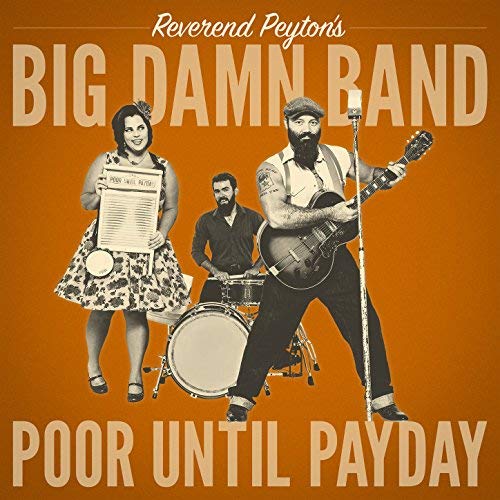
The Reverend Peyton’s Big Damn Band – POOR UNTIL PAYDAY
Genre: Blues
Favorite Tracks: “You Can’t Steal My Shine,” “Dirty Swerve,” “Poor Until Payday,” “I Suffer, I Get Tougher”
A three-piece featuring washboard virtuoso (and the Rev’s wife) Breezy Peyton, a rotating cast of drummers, and of course the Rev himself, Reverend Peyton’s Big Damn Band have spent over a decade exploring the world of blues music and, in turn, bringing blues to the world. For those unfamiliar with The Reverend Peyton, that brief background unquestionably does a disservice to the bearded, guitar-wielding troubadour, whose career on the road is filled with Hollywood adaptation-worthy stories. His blues licks, from the crowd-pleasing intensity of “Clap Your Hands,” to the reworked traditionalism of Charlie Patton on PEYTON ON PATTON, have long deserved a spotlight, and with POOR UNTIL PAYDAY, they rise to that level (even if the world hasn’t). Their ninth full-length sees Rev, Breezy, and drummer Max Senteney at the pinnacle of their powers, unleashing their best record to date. It’s a release that explores all of the group’s idiosyncrasies, with a collection of blues songs that feel emblematic of their journeymen status—a statement both of their current power and of lessons learned over a long and varied career. The Rev delivers a number of career highs, from a working class anthem in “Poor Until Payday” that’s fit for both the picket line and millennial Instagram memes, a filthy, Satanic, and plodding trip to the swampy Mississippi delta on “Me and the Devil,” and perhaps the group’s sexiest track yet, a dirty dancefloor stomp called “Dirty Swerve.” Yet the album’s crowning achievement comes early on opener “You Can’t Steal My Shine,” a muddied-up hymn that sees the Rev delivering a sermon worthy of being printed next to “This Little Light Of Mine.” While the group have hit highs in the past (2015’s SO DELICIOUS is an in-the-weeds, mean-mugged motherfucker of a guitar record), POOR UNTIL PAYDAY feels like a compendium of all the nooks and crannies they’ve explored in the blues genre, tirelessly finding pop-ready anthems, stadium rock solos, and some of the most satisfying guitar moments you’ll find on an album this year. Even if you’ve never heard of the Rev before, POOR UNTIL PAYDAY is an immediately accessible gateway into his world. [CJ Simonson]
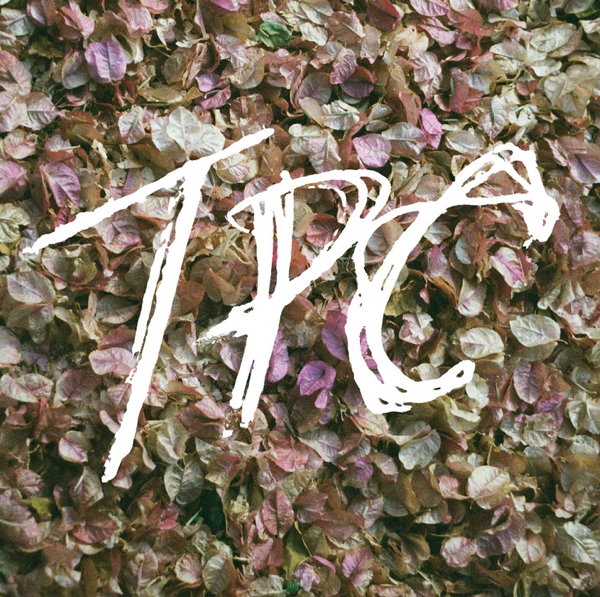
Tokyo Police Club – TPC
Genre: Indie Rock
Favorite Tracks: “Hercules,” “Can’t Stay Here,” “Edgy”
From 2006 through 2010, Tokyo Police Club were the true embodiment of indie rock in its roughest, indiest, form. The three releases they had in that five-year run name-checked multiple important labels from this decade (Paper Bag, Saddle Creek, Mom + Pop) while making obvious progress from scrappy, raw up-and-comers to decidedly slick, hook-oriented rock stars. Then the band hit their post-peak decline with releases like 2014’s overthought FORCEFIELD or last year’s dull dual-EP collection MELLON COLLIE AND THE INFINITE RADNESS. Those releases saw the band turn their sights away from the fun of the indie playground they had comfortably developed and instead towards something bigger, proggier, more earnest; in short, the songs got longer, the hooks were less fun to sing along to, the wit and witticisms faded away, and the music became a slog. Their latest, TPC, isn’t quite a return to the heyday, but at least some of the colorfulness has returned. When Dave Monks says he’s “just a simple dude,” that kind of acknowledgement alone reveals more of a smile than we’ve seen from this band in some time. It’s a record filled with a few vintage-sounding bops—the single, “Hercules,” is a climbing power pop track that feels simple and natural, and “Can’t Stay Here” touches on a lot of the fuller sound they’d matured into on 2010’s pinnacle CHAMP. Even with moments of genuine fun, there’s still a fair amount here that’s fairly forgettable. The opening tracks, “New Blues” and “Pigs,” are both passable but realistically sound better coming from a different band, with “Pigs” especially feeling more like a spun-out Wolf Parade tune. The acoustic guitar at the center of “Ready To Win” similarly feels off despite one helluva conclusion. At 51 minutes, TPC is far too long to be worthy of a listen, wearing out its welcome both in the songs (eight of the 12 songs are over four minutes in length and most of them feel it) and, in turn, throughout the album. Still, this is as good a Tokyo Police Club release as we’ve seen since that initial run, and fans of the band that haven’t given them a listen in a minute could find some playlistable material here. [CJ Simonson]
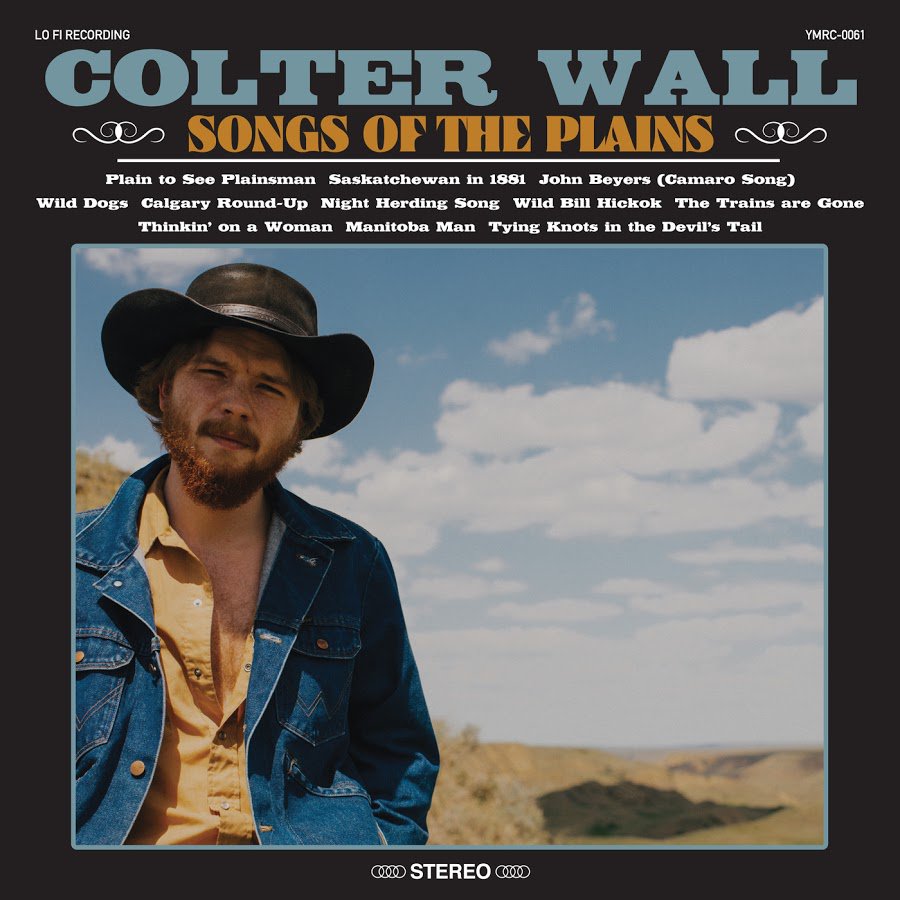
Colter Wall – SONGS OF THE PLAINS
Genre: Country
Favorite Songs: “Plain To See Plainsman,” “Night Herding Song,” “Wild Dogs”
There are a lot of exciting country artists hanging just outside of the margins of Nashville, and at the center is Colter Wall, a 22-year-old Canadian songwriter with an old school sound and profound, resonant bass voice that recalls artists from nearly a century ago. Wall, like many country musicians, makes it no secret where he comes from, with song titles like “Saskatchewan in 1881” and “Manitoba Man,” and his lyrics pull from old-timey themes like famous outlaws, workin’ and livin’ off the land, and beautiful women.
And with all of this in mind, I can’t help but recall the criticism that surrounds another youthful act drawing liberally from older musicians and, predictably, winning heavy amounts of praise from older music fans as a result. While Wall’s talent for songwriting and performing is undeniably present, what does SONGS OF THE PLAINS do to advance the country genre? It’s particularly disappointing in a time where country music is undergoing a significant creative renaissance, as the sphere of its influence expands outside of the mainstream music industry. It would be unfair to assume his intent or push some phony idea of “authenticity” onto a young artist, but SONGS OF THE PLAINS sounds more like it was written to earn praise from someone’s grandparents than a genuine artistic expression, and it’s just hard to get behind that when there are a lot of other more compelling artists in the fringe country world.
Even Wall’s prior releases felt a little bit less forced into this box of old cowboy songs. The songs that Wall has written here are fine, and my head believes in their sincerity—why would he bother making these songs if he didn’t believe in them?—but my heart doesn’t buy it, which might not even be his fault! Cowboys, in the Colter Wall sense, occupy a weird space in popular culture right now. It’s not a negative one, but in the wake of Mason Ramsey’s viral fame and a subsection of the internet that has discovered that it’s funny to conflate the everyday malaise of Extremely Online Gen-Z’ers with “cowboy” esoterica, it definitely doesn’t feel that the world is sincerely reappropriating the cowboy way. Nevertheless, Wall’s voice is almost infuriatingly rich, and he pulls off his old-timey rancher bard act well, delivering a record that will scratch the itch that only classic country can scratch, or, if you’re feeling a certain way, will accompany you as you wander the online trails of the digital frontier, wondering whether anyone can hear (or if anyone cares about) your yee-haws. [Adam Cash]
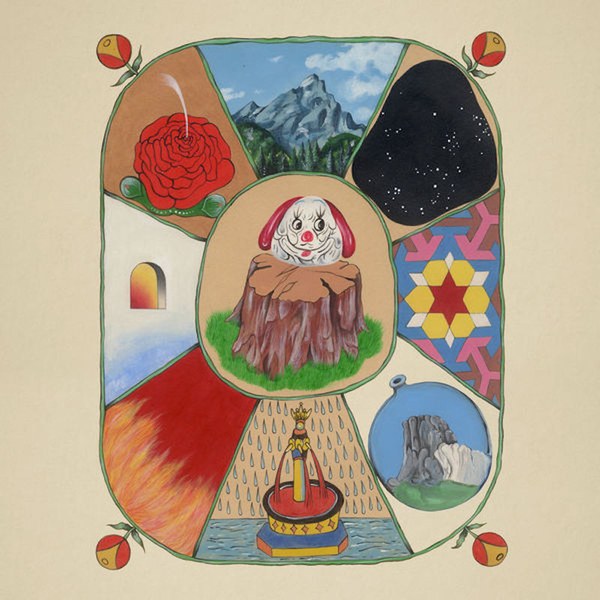
White Denim – PERFORMANCE
Genre: Garage Rock
Favorite Songs: “Sky Beaming,” “Performance”
PERFORMANCE is a fun record. In a lot of ways, on that merit alone, it’s worth a recommendation. But is it a good record? Probably not. Austin indie psych vets White Denim have made a record that, curiously, sounds more like a band’s debut than release number eight from a veteran of a rich scene. On one hand, PERFORMANCE feels like a recalibration for White Denim, and this is perhaps why it sounds like the band is brewing something new rather than leaning back on its heels. That’s a positive thing, as they haven’t really had a record that feels solid since 2009’s FITS. But it’s also disappointing on some level; while White Denim have the technical prowess of a veteran combo, PERFORMANCE has the uncertain feel of a band just starting out in its career. And there’s an even bigger problem—it doesn’t seem like the newly recalibrated White Denim is all that interesting. This White Denim is a band that seems to be made for the 4 PM slot at an outdoor music festival; they’re going to be fun to watch live and pack enough energy into their tunes to hold one’s attention through dehydration and a few beers, but it’s just hard to point to any of the tracks on PERFORMANCE as particularly affecting or memorable in recorded form.
PERFORMANCE has a fairly cut-and-dry ‘70s rock base in its sound, and overall, it’s reminiscent of a mid-fi, psyched-out My Morning Jacket record or an album of Grateful Dead covers from Ty Segall. It’s frequently enjoyable, always energetic, but still a bit too paint-by-numbers to be counted among White Denim’s best. If this record has a standout track, it’s “Sky Beaming,” which sounds kind of like a modern, more progressive take on Blue Öyster Cult. It shows off more of White Denim’s jam tendencies than the rest of the record and comes closer than any other track to carving out an identity for the band. Title track “Performance” benefits from its taut structure and an upbeat, early-2000s garage rock structure. Really, every song on this record is a good listen, if not particularly memorable. PERFORMANCE is a competent, breezy late summer release, but it’s hard to imagine anyone wanting to spend more than one listen with this record. [Adam Cash]






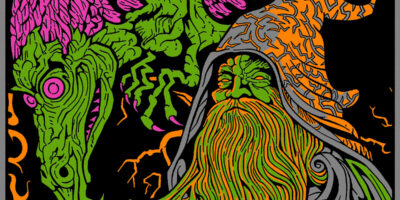



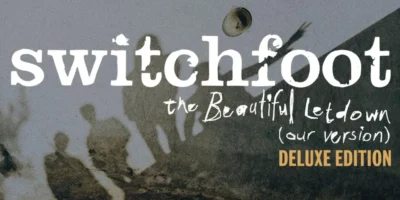





Comments